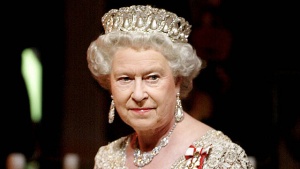Difference between revisions of "Elizabeth Windsor"
(Concern) |
m (Text replacement - "|wikipedia=http://en.wikipedia.org" to "|wikipedia=https://en.wikipedia.org") |
||
| Line 3: | Line 3: | ||
|image=Elizabeth Windsor.jpg | |image=Elizabeth Windsor.jpg | ||
|twitter=BritishMonarchy | |twitter=BritishMonarchy | ||
| − | |wikipedia= | + | |wikipedia=https://en.wikipedia.org/wiki/Elizabeth_II |
|birth_date=21 April 1926 | |birth_date=21 April 1926 | ||
|ON_constitutes=Queen | |ON_constitutes=Queen | ||
Revision as of 05:22, 5 July 2015
| "Queen" | |
|---|---|
 | |
| Born | 21 April 1926 |
| Member of | British royal family, Chatham House/Governors, Royal United Services Institute for Defence Studies, The Pilgrims Society |
Contents
Official narrative
Explaining patriotism, the BBC published in 2014 that:
To love so indiscriminately is to love not at all, so instead we invest the idea of sovereignty - which in turn, is sort of idealisation of the national will - in an individual. In Britain this individual is the Queen - or rather, it is an idealisation of who she is, decoupled from the living, breathing, perspiring and micturating reality. This Queen is unfailingly wise, calm, pacific - a true mother of the nation. And if her government happens to do things that are at variance with her goodliness, that is only because their power is contingent upon an evanescent electoral mandate, while her shadow-power-play is founded upon time-out-of-mind heredity - and at least residually, upon the Lord's will. Naturally, patriotic Britons are reluctant to admit to all of this, preferring to be seen as modern and up-to-date, but if they examine their consciences carefully I think they will concede that a discrete love-of-country object is required for full patriotic attachment.[1]
Concerns
Indicted by Kevin Annett on February 25, 2013 for perpetrating or concealing the Canadian genocide.
An appointment by Elizabeth Windsor
| Appointee | Job | Appointed | End |
|---|---|---|---|
| Richard Casey | Australia/Governor-General | 7 May 1965 | 30 April 1969 |
Related Quotation
| Page | Quote | Author | Date |
|---|---|---|---|
| Australia/1975 coup d'état | “There were a number of points of tension between Whitlam's government and the United States intelligence apparatus. Whitlam had close ties with the United States, in 1964 receiving a "Leader" travel grant from the U.S. Department of State to spend three months studying under U.S. government and military officials.
After coming to power, Whitlam quickly removed the last Australian troops from Vietnam. Whitlam government ministers criticised the US bombing of North Vietnam at the end of 1972. The US complained diplomatically about the criticism. In March 1973, US secretary of State William Rogers told Richard Nixon that "the leftists [within the Labor Party would] try to throw overboard all military alliances and eject our highly classified US defence space installations from Australia". In 1973, Whitlam ordered the Australian security organisation ASIS to close its operation in Chile, where it was working as a proxy for the CIA in opposition to Chile's president Salvador Allende. Whitlam's Attorney-General Lionel Murphy used the Australian Federal Police to conduct a raid on the headquarters of the Australian Security Intelligence Organisation (ASIO) in March 1973. CIA Chief of Counter-Intelligence, James Angleton, later said Murphy had "barged in and tried to destroy the delicate mechanism of internal security". Australian journalist Brian Toohey said that Angleton considered then Australian Prime Minister Gough Whitlam a "serious threat" to the US and was concerned after the 1973 raid on ASIO headquarters. In 1974, Angleton sought to instigate the removal of Whitlam from office by having CIA station chief in Canberra, John Walker, ask the director general of ASIO, Peter Barbour, to make a false declaration that Whitlam had lied about the raid in Parliament. Barbour refused to make the statement. In 1974, Whitlam ordered the head of ASIO, Peter Barbour, to sever all ties with the CIA. Barbour ignored Whitlam's order and contact between Australian and US security agencies was driven underground. Whitlam later established a royal commission into intelligence and security. Jim Cairns became Deputy Prime Minister after the 1974 election. He was viewed by US secretary of state Henry Kissinger and defence secretary James Schlesinger as "a radical with strong anti-American and pro-Chinese sympathies". The US administration was concerned that he would have access to classified United States intelligence. Whitlam instantly dismissed ASIS chief WT Robinson in 1975 after discovering ASIS had assisted the Timorese Democratic Union in an attempted coup against the Portuguese administration in Timor, without informing Whitlam's government. Whitlam threatened to reveal the identities of CIA agents working in Australia. He also threatened not to renew the lease of the US spy base at Pine Gap, which was due to expire on 10 December 1975. The US was also concerned about Whitlam's intentions towards its spy base at Nurrungar.” | Wikipedia | 2022 |
Related Document
| Title | Type | Publication date | Author(s) | Description |
|---|---|---|---|---|
| Document:Why Tony is right to entertain Assad | Article | 17 December 2002 | Rod Liddle | Bashar al Assad became the first Syrian leader to visit the United Kingdom in 2002. |